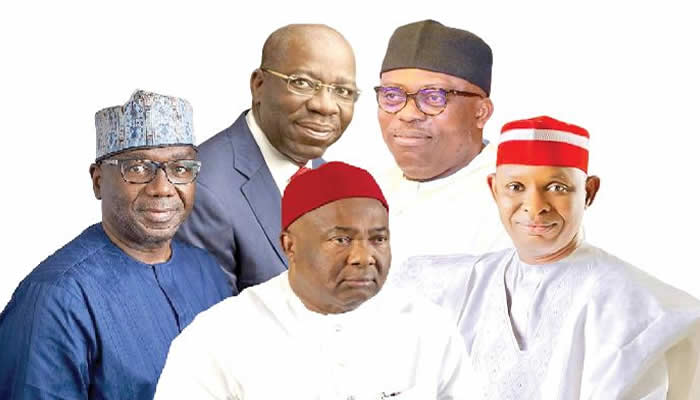In the complex landscape of Nigerian politics, the concept of power dynamics often turns into a reflection of personal vendettas, as discussed by DIRISU YAKUBU. The notion, drawn from Mao Zedong’s perspective that politics can be seen as warfare without bloodshed, is particularly resonant in Nigeria where the post-election environment frequently shifts from electoral contestation to personal attacks. Politicians, particularly sitting governors, have been known to engage in the erosion of their opponents’ properties as a means of asserting dominance and revenge after electoral victories. This phenomena is vividly illustrated by numerous instances where political leaders have resorted to acts of demolition and property confiscation targeting their political adversaries, thereby undermining the essential democratic values.
One notable case is that of Edo State Governor Godwin Obaseki, who, after his re-election in 2020, revoked the Certificates of Occupancy of various properties belonging to former political office holders, including those of his opponents. The justification provided was that these properties were gains bestowed upon individuals by the prior administration merely out of goodwill. Similar actions were seen in Imo State under Governor Hope Uzodimma, who marked the house of his predecessor’s spokesperson for demolition, illustrating how political oblivion can overshadow lawful proceedings. Establishments like the roundabouts constructed by former governor Rochas Okorocha were famously demolished under Uzodimma, revealing an ongoing cycle of political retaliation that exemplifies the contentious climate of faithless governance.
Moreover, recent events in Kano State, under Governor Abba Yusuf, have shown a similar trajectory of property demolitions linked directly to prior administrations, specifically that of Abdullahi Ganduje. Yusuf’s actions not only point to a deeply entrenched practice of demolishing what he deems “illegally built” structures, but they also signal an underlying narrative of personal and political rivalry stemming from age-old political alliances and enmities. His public directives emphasized taking back what was perceived as misappropriated public assets, further entrenching the view that political governance is frequently steeped in retribution rather than constructive policy-making.
Kwara State’s recent demolitions of the Crystal Place shopping mall provide another poignant example of this political bitterness. The action was allegedly targeted at properties belonging to individuals affiliated with opposition leadership, including former governor Bukola Saraki. As these examples accumulate, they highlight a broader trend where the demolition of properties has become synonymous with the competitive nature of Nigerian politics, characterized by a resolve to settle scores rather than serving the common good. High-profile political figures have criticized such practices as damaging to Nigeria’s socio-economic development and indicative of a political culture that thrives on envy and retribution.
Many commentators have weighed in on the implications of these destructive practices. Former Education Minister Prof. Tunde Adeniran voiced concern over the devastating impact of demolitions on the investment landscape, labeling this trend as symptomatic of Nigeria’s toxic political environment. Echoing this sentiment, commentator Jide Ojo warned that such actions reflect an obsession with demolishing the legacy of predecessors and demonstrate a lack of long-term vision regarding governance. Considerable disbelief surrounds the potential for future cooperation when the cultural norm shifts toward indiscriminate destruction based on political lines, as observed in the example of Governor Siminalayi Fubara’s opposition to Nyesom Wike’s projects in Rivers State.
Prominent civil society advocates have condemned the practice as a deplorable element of Nigeria’s political landscape. Activists like Joe Okei-Odumakin emphasized the role of personal vendettas in exhibiting poor character among public servants. Meanwhile, political figures within the ruling party have labeled the demolitions as reckless and economically detrimental, indicating that this practice undermines the livelihoods of many individuals who rely on these properties for their income. Suraju Olanrewaju of the Human and Environmental Development Agenda has called for a newfound maturity within the political class, advocating a transition from political intolerance to one focused on public service, underscoring the need for a political framework that thrives on rational discourse rather than retributive actions.
The practice of demolishing opponents’ properties in Nigeria ultimately exacerbates a zero-sum game mentality among politicians, detracting from the foundation of democratic plurality and governance. The entrenched nature of this behavior is indicative of a significant challenge for political reconciliation and socio-economic growth in Nigeria. As the country continues to navigate these turbulent political waters, the synthesized call for politicians to act in the public interest rather than personal aggrandizement must rise to the forefront of discussions on governance. Only with a commitment to constructive political behavior can Nigeria aspire to achieve the meaningful progress its populace desires, setting aside vindictive tactics for the principles of governance that genuinely serve the people.


